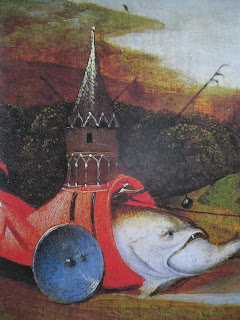It was with a certain weariness of both heart
and spirit that Michael began to look through Homer Rubik’s work. The task—for Michael felt that’s what
it was—was scarcely made easier by Bliss Carmen’s looming stage-mother
eagerness, by her rabid, over-the-shoulder determination that Michael would
find in Homer’s paintings and drawings the lashings of genius.
“Look how much stuff
he’s made!” boomed Bliss.
“Impressive,” Michael
agreed. “though of course it isn’t the number of works he’s made but their quality that counts,” he added hastily—and, he
felt, pointlessly. Bliss was deaf
to anything even remotely negative or even cautionary about Homer’s work. Homer, for his part, stood like a
neglected statue, watching Michael’s deliberations. He wasn’t nearly as interested in Michael’s approval as
Bliss was, but he had a practiced ear for an insult, a put-down or even a
reservation. He watched Michael,
scowling.
Bliss noticed Homer’s
un-tethered condition and deemed it dangerous. Bliss was enough of a loose-cannon herself not to be wary of
it in others. All she needed right
now was for Homer to plummet into his feral mode and start growling at the
visiting art critic.
“Why don’t you make
coffee, Homer?” she suggested, as gaily as possible.
“None for me,” said
Michael abstractly, now perusing a strange little Goya-like painting of some
unidentified massacre on an unidentified plain located somewhere in Homer’s
rough, antique imagination.
Homer stiffened with
the beginnings of rage. Bliss gave
Michael a resounding, corrective whack across the shoulders.
“Well, okay,” he told
Homer, trying quickly to fabricate a smile. “a coffee might be nice after all.”
Homer went the fridge
and opened the door. Michael could
smell the sour, empty air from inside from across the room.
“Fuck!” said Homer.
“What’s the matter,
Homer?” asked Bliss nervously, anxious not to disrupt the atmosphere of
studious connoisseurship she was trying hard to establish in the dank
kitchen-studio.
“No milk,” said Homer
darkly.
“Who the hell cares??” roared Bliss. “Make some goddam coffee!!”
Michael tried hard to
believe he was somewhere else.
Watching May dust shelves in the bookstore, maybe.
He dutifully examined
work after work. Most of the
pictures were small, notebook-sized, usually in oil on paper, though there were
a few executed in tempera. The
drawings were either made with charcoal or, more often, drawn in sepia
ink—which lent them a certain old-masterish earnestness.
But it was Homer’s
subject matter that intrigued him most—intrigued him and dismayed him. The paintings were technically
skilful—astoundingly so—but uniformly ghastly in subject matter. There were gory battles, the mounted,
charging figures as tiny and exacting as those in a Messonnier. There were Inqusition-like scenes, like
plunderings from Goya’s etchings: burnings, hangings, torturings,
dismemberings. There were
beheadings, drownings, whippings, stranglings. There were pictures in which the humanoid subjects were so
distorted and convoluted they made the hallucinated figures in Hieronymus Bosch
seem sensible and well-ordered.
Michael felt sweaty
and a little dizzy.
“So what do you
think, Zorba?” bellowed Bliss. “Amazing aren’t they?”
“They are that,”
Michael agreed, feeling bilious.
Homer stood
listening, torn between the desire to be accommodating and the fierce need to
tear this intrusive art critic limb from limb.
“You like ‘em?” he
asked Michael with a growl.
Michael was
momentarily frozen with indecision.
Ought he to say what he really felt or just carefully dissemble for a
while?
“Well,” he said at
last, trying to keep his eyes on the pile of paintings and not look either at
Homer or at Bliss, "I can tell you truthfully that I’ve never seen anything
quite like them
before!”
Bliss was
exultant. But Homer, who suddenly
seemed smarter and more perceptive than Michael had given him credit for,
scowled and rumbled.
“I mean do you
think they’re good?”
“Oh sure,” Michael faltered, trying too
smile convincingly. “Unique!”
“There!” said Bliss exultantly, giving Homer a
python-like squeeze around the waist.
“You see??”
